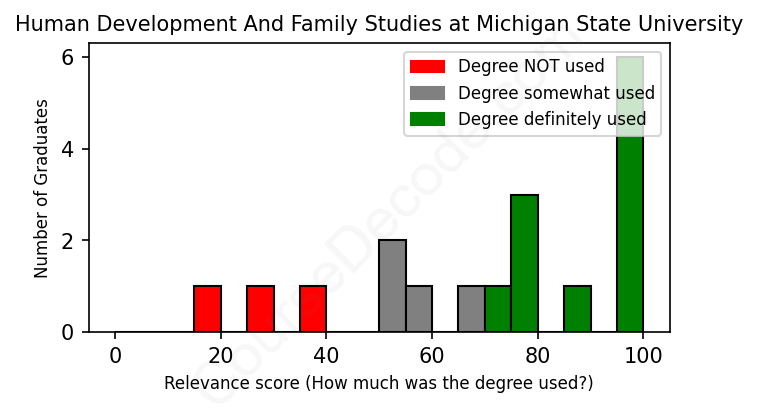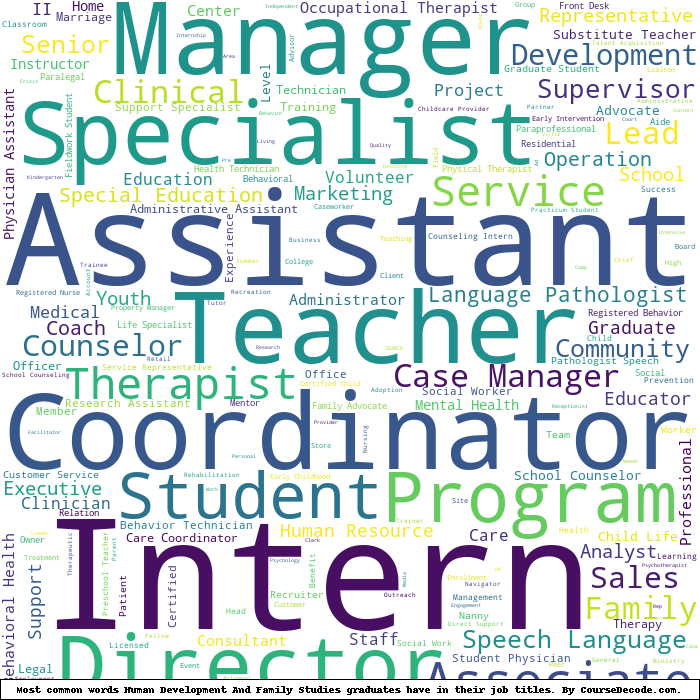
First, some facts. Of the Human Development And Family Studies graduates from Michigan State University we've analyzed , here's how many have used (or NOT used) their degree in their career:

These are estimates based on AI analysis of 18 LinkedIn profiles (see below).
The verdict? Slightly above average. Overall, with an average relevance score of 71%, Human Development And Family Studies graduates from Michigan State University have a slightly higher likelihood (+4%) of finding work in this field compared to the average graduate across all fields:
And for comparison, here's the chart for all profiles we've looked at across all degrees.
Also, after graduating, 38% of these graduates have pursued further education other than another Bachelor's degree (such as a Masters degree or other), compared to the average across all profiles of 35%. This suggests you may need more than just a Bachelors degree to be competitive as a Human Development And Family Studies graduate.
See the details:
|
Relevance score: 50% We think this person has gone into a career only somewhat relevant to their degree. We think this person has gone into a career only somewhat relevant to their degree.
DEGREE INFOGraduated in 2020 from Michigan State University with a Bachelor's degree in Human Development And Family Studies. No other secondary education since. JOB HISTORY SINCE GRADUATIONUnderwriter United Wholesale Mortgage May 2021 - Present ABOUTNo information provided. |
The top 10 most common jobs done by the graduates we've analyzed (ranked most common to least) are:
When looking at the job trajectories of folks who graduated with a degree in Human Development and Family Studies from Michigan State University, it’s clear that a significant number of them have landed roles closely related to their field of study. The most common positions include Speech Language Pathologists, therapists, lead teachers, and various roles in foster care and child development. For instance, many graduates became Speech Language Pathologists, where they directly apply knowledge about communication and developmental issues, crucial to understanding family dynamics. Similarly, several have taken on therapist roles providing support and counseling, which inherently utilize their background in human behavior and family relationship management.
Overall, the majority of jobs held by these graduates appear to be highly relevant to Human Development and Family Studies, particularly those centered around children's development, therapy, and education. However, there are also cases where graduates drifted into positions that don’t make full use of their degree, such as administrative roles or jobs in unrelated fields like mortgage underwriting. So, while there’s a strong link between their educational background and their career choices, it also highlights that not every path is a straight line back to their studies. Many have successfully integrated the principles they learned into various roles that benefit from this knowledge, showcasing the versatility of their degree in the workforce.
Here is a visual representation of the most common words in job titles for Human Development And Family Studies graduates (this is across all Human Development And Family Studies graduates we've analyzed, not just those who went to Michigan State University):

Looking at the career trajectories of graduates from Michigan State University who studied Human Development and Family Studies, it's pretty clear that many of them end up in fields that are closely related to their degree. Right out of college, a lot of these folks snag their first jobs in educational or therapy settings, often becoming speech-language pathologists, teachers, or therapists. For instance, several alumni have taken roles as Speech Language Pathologists after gaining their initial experience through internships in educational or health settings. This trend shows a solid connection between their study focus and their early career choices.
As we look further down the line, say five to ten years later, many graduates seem to stick with roles that reflect their human development knowledge. Some continue along the educational or therapeutic paths, advancing in positions with more responsibilities like lead teachers or specialized therapists. However, there are also those who have veered off into less directly related jobs—like administrative roles or positions in customer service—indicating that not everyone stays within the sphere of family studies. Overall, it looks like a good number of graduates are finding fulfilling careers relevant to their studies, but there are also notable instances of career paths that drifted away from the core focus of Human Development and Family Studies. So, while many are doing well, it’s a mixed bag depending on individual choices and opportunities.
Honestly, a Bachelor’s degree in Human Development and Family Studies at Michigan State University—like in general—tends to be on the easier side compared to some other degrees. You'll definitely have your share of challenging classes, especially if you dive deep into areas like research methods or statistics, but a lot of the coursework is pretty relatable and focuses on everyday life and interactions, which makes it more engaging. Plus, if you're someone who enjoys working with people and understanding their experiences, it can feel less like traditional studying and more like learning about real-world stuff. So, while you'll still have to put in effort, it might not feel as tough as some of the more technical majors!
Most commonly, in the LinkedIn profiles we've looked at, it takes people 4 years to finish a Bachelor degree in Human Development And Family Studies.
Looking at these Human Development and Family Studies graduates from Michigan State University, it seems like they've landed a variety of jobs, but not all of them give the impression of raking in big bucks. Many of the roles are in education, social work, and therapy, which can be rewarding but often come with modest salaries, especially at the entry level. For example, positions like lead teachers and social workers tend to be on the lower end of the pay scale. However, some graduates who've gone into specialized roles, like speech-language pathology, might be doing a bit better since medical-based jobs often pay more. Overall, it looks like while some are probably doing okay, others are likely just scraping by, especially early in their careers.
Here is a visual representation of the most common words seen in the "about" section of LinkedIn profiles who have a Bachelor degree in Human Development And Family Studies (this is across all Human Development And Family Studies graduates we've analyzed, not just those who went to Michigan State University). This may or may not be useful:

Here are all colleges offering a Bachelor degree in Human Development And Family Studies (ordered by the average relevance score of their Human Development And Family Studies graduates, best to worst) where we have analyzed at least 10 of their graduates:
| College | Score | Count |
|---|---|---|
 Oklahoma State University Oklahoma State University
|
91 | 10 |
 University of Wisconsin-Madison University of Wisconsin-Madison
|
84 | 15 |
 University of Wisconsin-Stout University of Wisconsin-Stout
|
83 | 22 |
 The University of Texas at Austin The University of Texas at Austin
|
81 | 14 |
 Virginia Tech Virginia Tech
|
80 | 12 |
 The Ohio State University The Ohio State University
|
77 | 12 |
 Penn State University Penn State University
|
76 | 34 |
 University of California, Davis University of California, Davis
|
76 | 18 |
 Kansas State University Kansas State University
|
75 | 17 |
 University of North Texas University of North Texas
|
74 | 12 |
 University of Illinois at Urbana-Champaign University of Illinois at Urbana-Champaign
|
74 | 12 |
 Brigham Young University Brigham Young University
|
73 | 28 |
 University of Connecticut University of Connecticut
|
72 | 22 |
 Michigan State University Michigan State University
|
71 | 18 |
 Texas Tech University Texas Tech University
|
70 | 26 |
 Colorado State University Colorado State University
|
69 | 41 |
 Bowling Green State University Bowling Green State University
|
69 | 18 |
 University of Rhode Island University of Rhode Island
|
69 | 14 |
 Oregon State University Oregon State University
|
68 | 28 |
 Washington State University Washington State University
|
67 | 16 |
 University of Arizona University of Arizona
|
62 | 13 |
 The University of Alabama The University of Alabama
|
62 | 10 |
 Arizona State University Arizona State University
|
61 | 29 |
 The University of Georgia The University of Georgia
|
61 | 17 |
 University of North Carolina at Greensboro University of North Carolina at Greensboro
|
58 | 14 |
 California State University San Marcos California State University San Marcos
|
49 | 12 |